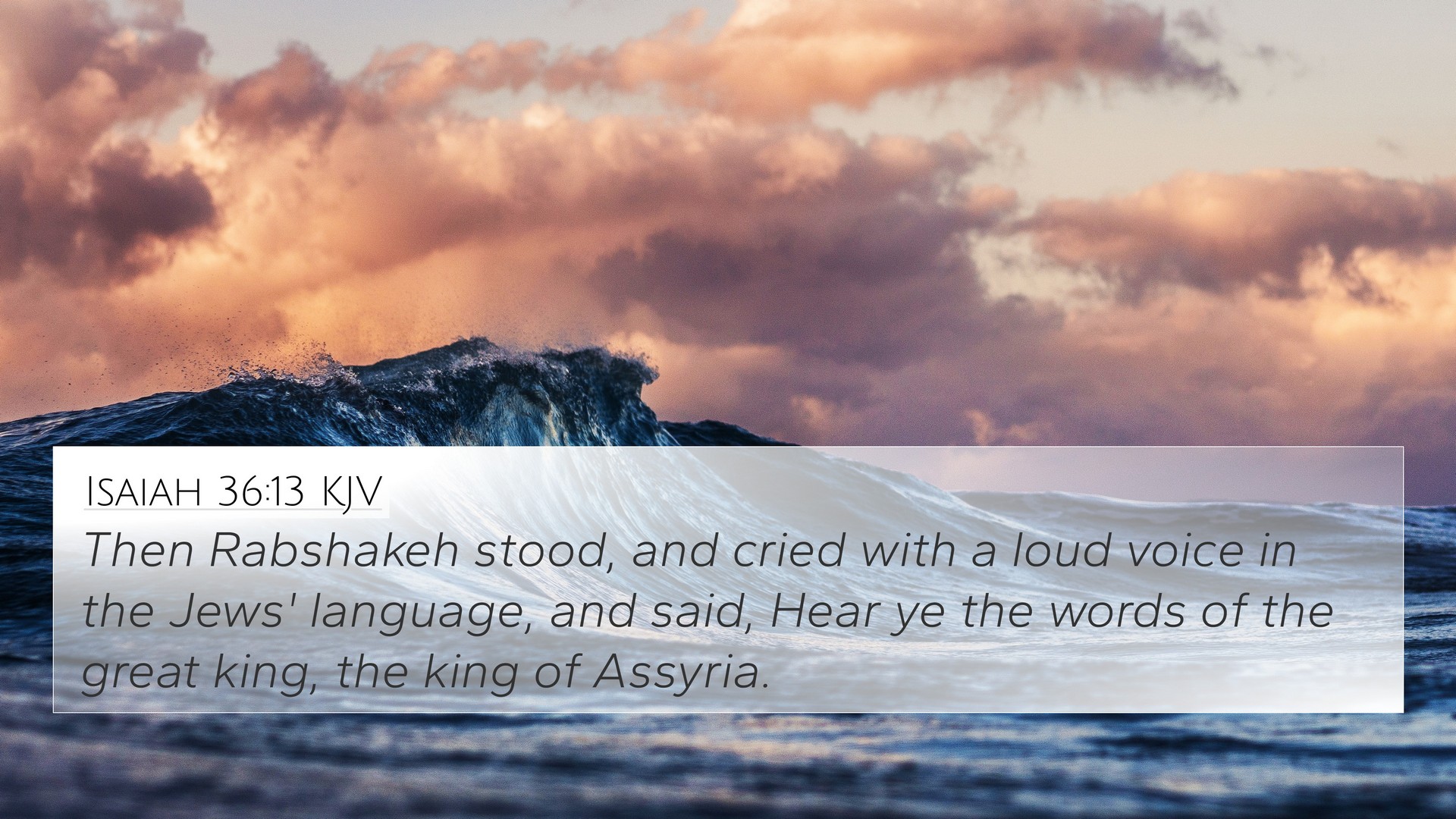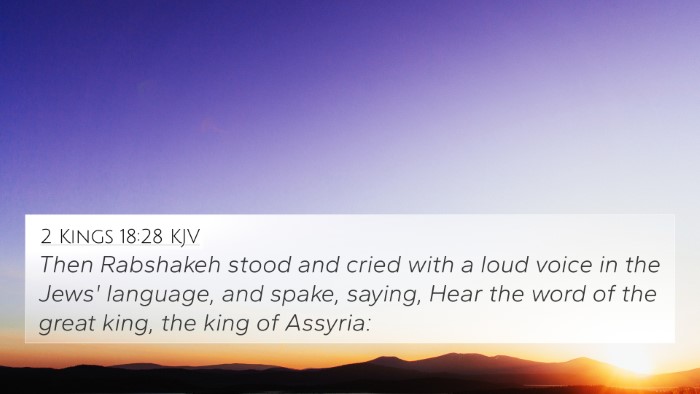Understanding Isaiah 36:13
Verse: Isaiah 36:13 - "Then Rabshakeh stood and cried with a loud voice in the Jews' language, and said, Hear the words of the great king, the king of Assyria."
Summary and Interpretation
The passage in Isaiah 36:13 marks a pivotal moment during the Assyrian siege of Jerusalem. The name Rabshakeh refers to an Assyrian official who served as a mouthpiece for his king. In this context, the act of speaking in the Hebrew language signifies an attempt to intimidate and demoralize the people of Jerusalem, aiming to sow doubt about their faith in God.
Insights from Public Domain Commentaries
- Matthew Henry: Henry emphasizes the brashness of Rabshakeh, stating that his loud voice was meant to instill fear in the hearts of the people. He notes the strategic choice of language, as delivering his threats in the Jews' language was meant to undermine their confidence.
- Albert Barnes: Barnes points out that the Assyrian king attempts to position himself as a superior power through Rabshakeh's proclamation. The intent is not merely to intimidate but to persuade the people of Jerusalem to surrender by showcasing the Assyrian might.
- Adam Clarke: Clarke observes the rhetoric used by Rabshakeh, indicating that the intent is to disrupt the people's faith in their God. This moment illustrates the psychological warfare of the Assyrians, capitalizing on fear and doubt.
Thematic Analysis
This verse serves as a pivotal point in the larger narrative about faith, fear, and the power of words. The proclamation embodies themes of spiritual warfare and the importance of remaining steadfast in one’s beliefs amidst external threats.
Bible Verse Cross-References
Isaiah 36:13 can be linked to various other scriptures that provide additional context and insights. Notably, the following Bible verses can enhance our understanding of this passage:
- 2 Kings 18:28-30 - Further details the threats made by Rabshakeh and his ridicule of the God of Israel.
- Isaiah 37:6-7 - God’s promise to protect Jerusalem despite the threats posed by Assyria.
- Psalm 46:1-3 - A reminder of God’s protection and the absence of fear even amidst turmoil.
- Jeremiah 17:5 - Highlights the consequences of trusting in human powers rather than the Lord.
- Isaiah 37:33-35 - God's assurance to defend Jerusalem and thwart the plans of the Assyrians.
- 2 Chronicles 32:8 - Assurances that the strength of their foes is nothing compared to their reliance on God.
- Isaiah 31:1 - Warns against relying on foreign alliances rather than seeking the help of the Lord.
- Proverbs 18:21 - A reminder of the power of words, which can build up or destroy.
- 1 Peter 5:8 - An admonition to be vigilant against those who might exploit fear and doubt.
- Romans 8:31 - The affirmation that if God is for us, who can stand against us?
Importance of Cross-Referencing in Biblical Studies
Cross-referencing Biblical texts like Isaiah 36:13 aids in exploring thematic Bible verse connections and understanding the intricacies of the scriptures. Here are some methods to utilize:
- Bible Concordance: Using a concordance allows you to find related verses based on keywords and themes.
- Cross-Reference Guides: Utilize guides designed to highlight connections across different books of the Bible.
- Study Bibles: Many editions include cross-references and notes that provide context on prophetic and historical texts.
- Comparative Bible Verse Analysis: A detailed examination of passages can unveil deeper meanings and correlations.
Applying Cross-References for Deeper Understanding
When studying passages like Isaiah 36:13, it can be beneficial to ask:
- What verses are related to Isaiah 36:13?
- What are the connections between Isaiah 36:13 and other scriptures dealing with fear and faith?
- How do the themes presented in this verse manifest in both the Old and New Testaments?
Conclusion
Isaiah 36:13 serves as a crucial reminder of the struggle between trust in God and fear of human threats. It is a lesson on the power of words in the midst of crises and the ways God reassures His people amidst daunting challenges. By engaging in comprehensive Bible cross-reference materials, readers can enhance their understanding and gain insights into the interconnectedness of scriptural texts.













